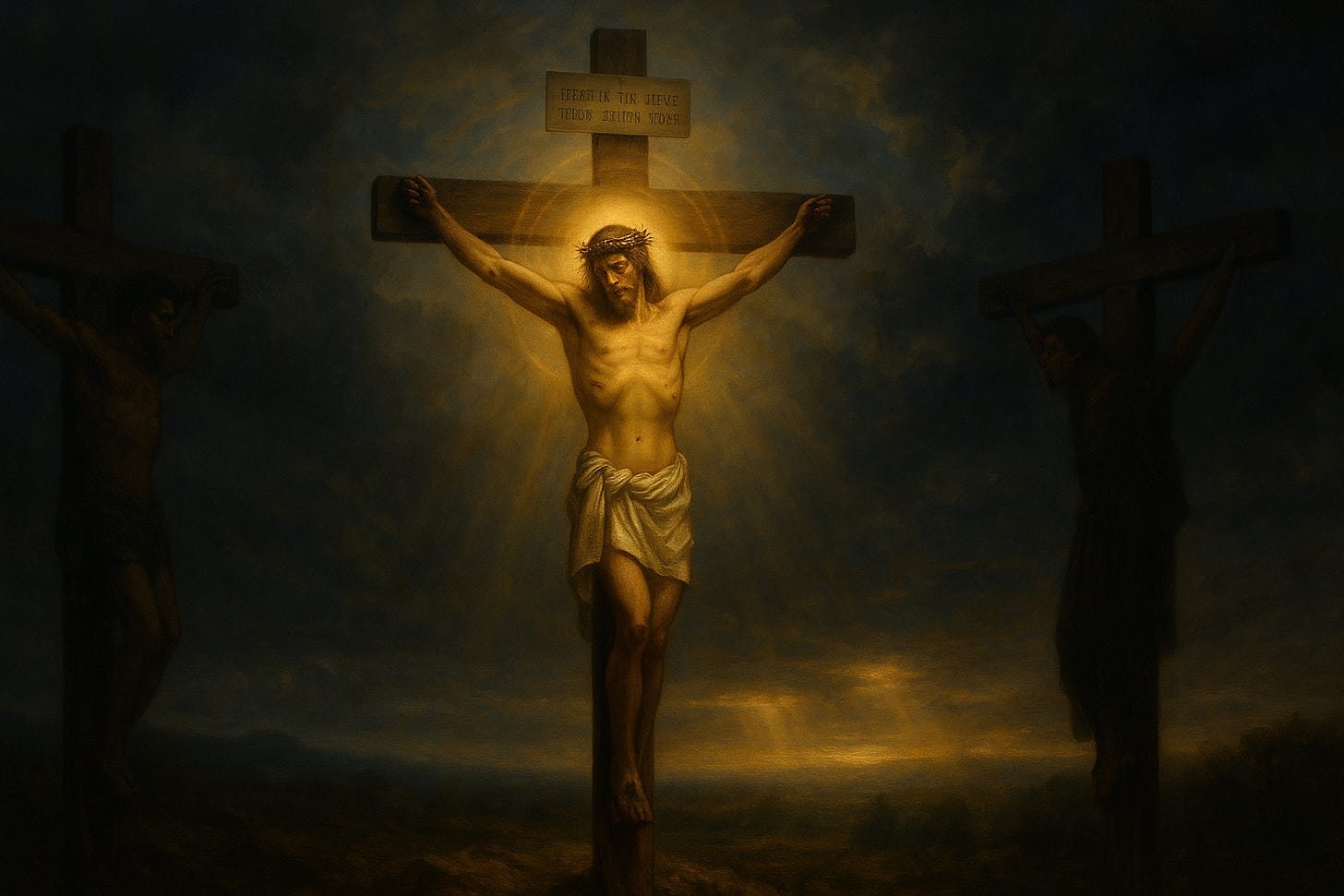The King on the Cross: Mercy in the Shape of Majesty
Luke 23:33-43
Where Beauty Defies Despair
On May 27, 1992, a mortar shell landed in a Sarajevo marketplace, killing twenty-two civilians waiting for bread. The next day, a cellist named Vedran Smailović carried his instrument to the crater, placed a chair among the ruins, and began to play Albinoni’s Adagio in G minor. He returned every day for twenty-two days—one performance for each life lost. No speeches, no protest banners, only music in the middle of rubble. Beauty, refusing to be silent.
Luke’s Gospel leads us to a similar scene of defiant beauty. A hill called The Skull. Three crosses raised against a bruised sky. Soldiers gambling for clothing. Spectators watching death as if it were theater. Yet in the center, words are spoken that sound like music:
“Father, forgive them, for they don’t know what they are doing.”
Amid empire’s noise and mockery, mercy begins to play its quiet song.
Seeing the Scene Clearly
Luke’s narration is spare, as if brevity itself is reverence. “When they came to the place called The Skull, they crucified him there, along with the criminals—one on his right, the other on his left.” (23:33)
This is not a private agony. Roman crucifixion was designed for public pedagogy—the empire’s billboard of control. The posted charge, “This is the King of the Jews,” appears in Greek, Latin, and Hebrew: commerce, empire, covenant. What Rome intended as sarcasm becomes a multilingual gospel. Every culture reads the same ironic truth—the King reigns from a cross.
Luke alone preserves two statements that define the entire theology of the cross:
“Father, forgive them …”—mercy before repentance.
“Today you will be with me in paradise”—hope before proof.
The mockers demand proof through spectacle—“Save yourself!”—but Jesus refuses to perform. Power that must prove itself is not power at all. Divine sovereignty is revealed in restraint, in the will to absorb violence without returning it.
Between the two criminals hangs the world’s decision: cynicism or trust. One hurls sarcasm; the other whispers faith. “Remember me when you come into your kingdom.” The difference is not moral résumé but interpretive sight. One reads only the inscription; the other reads the heart behind it. Faith, in Luke’s world, is right interpretation—seeing glory hidden in disgrace.
Mercy as Majesty
1. The Forgiving King
Jesus’ first prayer on the cross inaugurates a new order of power. Forgiveness is not appended to kingship; it is kingship. In Luke’s Gospel, authority expresses itself through mercy—from the prodigal’s father running down the road to the Samaritan binding wounds. Here that mercy culminates.
“Father, forgive them.” The verb ἄφες carries both release and remittance—the canceling of a debt. The imperfect tense implies continuous action: He kept saying. Even as nails are driven, the King continues His royal decree of pardon. He reigns not over subjects but for sinners.
A Rwandan priest once told survivors of genocide, “Forgiveness is the only power left to us when everything else is gone.” That is Luke’s theology in one sentence. The cross unmasks our addiction to retaliation and replaces it with a kingdom of grace.
2. The Penitent Disciple
The second criminal, traditionally named Dismas, reads the sign rightly. “This man has done nothing wrong.” He sees innocence where the crowd sees failure. His request—“Remember me”—echoes Israel’s covenantal language: to remember is to act faithfully. It is less petition than partnership: Include me when your reign begins.
Jesus’ response reverses chronology. “Today you will be with me in paradise.” The future tense of hope collapses into the present. Paradise is no longer distant garden but immediate communion. Salvation is presence, not postponement. “With me”—two words that relocate heaven from geography to relationship.
Living Beneath the Cross Today
Power Reframed.
In an age obsessed with visibility, Jesus shows that the deepest authority is unseen. Real leadership is not the ability to control outcomes but the courage to carry burdens. Whether in a boardroom, classroom, or home, the cross asks: Do I lead to be admired or to heal?Forgiveness Before Understanding.
Most of us wait to forgive until we understand the motive or see remorse. Jesus forgives in the fog of ignorance—“they know not.” That is discipleship’s hardest imitation. Corrie ten Boom discovered this when she faced a former guard from Ravensbrück and chose, against every feeling, to extend her hand. She later wrote, “Forgiveness is not an emotion; it is an act of the will, and the will can function regardless of the temperature of the heart.”¹Paradise Now.
Jesus’ “Today” invites believers to live resurrection on this side of the grave. Each act of mercy reopens Eden’s gate. Whenever reconciliation replaces revenge, the garden blooms again.Witness Through Presence.
The Sarajevo cellist did not end the war, but his presence changed the narrative of his city. Christians bear the same vocation: to play beauty amid the ruins, to make grace audible in a violent world.
BENEDICTION - The View from Above
On Christmas Eve 1968, as Apollo 8 orbited the moon, astronauts read Genesis 1 to a world watching the Earth rise above lunar shadow. “And God saw that it was good.” For a moment humanity glimpsed its small blue home suspended in light. From that height, divisions faded. The astronauts ended the broadcast with, “God bless all of you on the good Earth.”
At Calvary, another vantage point emerges—not from above but from below. From the hill of execution, the Son of God looks upon a violent planet and declares not judgment but grace. He saw, and called it redeemable.
So we stand beneath the cross and hear again the music of mercy:
“Father, forgive…”
“Today… with me.”
The King still reigns, and the throne is still a cross.


